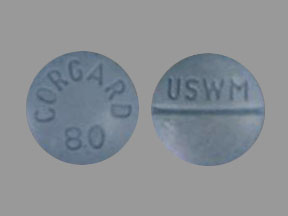Corgard
Generic name: nadolol [ na-DOE-lol ]
Drug class: Non-cardioselective beta blockers
What is Corgard?
Corgard is a beta-blocker that affects the heart and circulation (blood flow through arteries and veins).
Corgard is used to treat angina (chest pain) or hypertension (high blood pressure).
Corgard may also be used for other purposes not listed in this medication guide.
Corgard side effects
Get emergency medical help if you have signs of an allergic reaction: hives; difficulty breathing; swelling of your face, lips, tongue, or throat.
Corgard may cause serious side effects. Call your doctor at once if you have:
-
a light-headed feeling, like you might pass out;
-
slow heartbeats;
-
shortness of breath (even with mild exertion), swelling, rapid weight gain; or
-
bronchospasm (wheezing, chest tightness, trouble breathing).
Common side effects of Corgard may include:
-
numbness or cold feeling in your hands or feet;
-
dizziness;
-
feeling tired;
-
vision problems; or
-
mood changes, confusion, memory problems.
This is not a complete list of side effects and others may occur. Call your doctor for medical advice about side effects. You may report side effects to FDA at 1-800-FDA-1088.
Warnings
You should not use Corgard if you have asthma, a serious heart condition, severe heart failure, or if your heart cannot pump blood properly.
Before taking this medicine
You should not use Corgard if you are allergic to it, or if you have:
-
asthma;
-
a serious heart condition such as "AV block" (2nd or 3rd degree) or severe heart failure; or
-
if your heart cannot pump blood properly.
To make sure Corgard is safe for you, tell your doctor if you have:
-
coronary artery disease (clogged arteries);
-
congestive heart failure;
-
a thyroid disorder;
-
kidney disease;
-
diabetes (taking Corgard can make it harder for you to tell when you have low blood sugar); or
-
a history of allergies.
It is not known whether Corgard will harm an unborn baby. This medicine may cause heart or lung problems in a newborn if the mother takes the medicine during pregnancy. Tell your doctor if you are pregnant or plan to become pregnant while using this medicine.
Nadolol can pass into breast milk and may harm a nursing baby. You should not breast-feed while taking nadolol.
How should I take Corgard?
Follow all directions on your prescription label. Your doctor may occasionally change your dose to make sure you get the best results. Do not use Corgard in larger or smaller amounts or for longer than recommended.
Corgard is usually taken once per day. Follow your doctor's dosing instructions very carefully.
Do not skip doses or stop using Corgard suddenly. Stopping suddenly may make your condition worse. Follow your doctor's instructions about tapering your dose.
Your blood pressure will need to be checked often.
This medicine can cause unusual results with certain medical tests. Tell any doctor who treats you that you are using Corgard.
If you need surgery, tell the surgeon ahead of time that you are using Corgard.
If you are being treated for high blood pressure, keep using this medicine even if you feel well. High blood pressure often has no symptoms. You may need to use blood pressure medicine for the rest of your life.
Corgard is only part of a complete program of treatment for hypertension that may also include diet, exercise, and weight control. Follow your diet, medication, and exercise routines very closely if you are being treated for hypertension.
Store at room temperature away from moisture, heat, and light. Keep the bottle tightly closed when not in use.
What happens if I miss a dose?
Take the missed dose as soon as you remember. Skip the missed dose if your next dose is less than 8 hours away. Do not take extra medicine to make up the missed dose.
What happens if I overdose?
Seek emergency medical attention or call the Poison Help line at 1-800-222-1222.
Overdose symptoms may include slow heart rate, extreme dizziness, or fainting.
What should I avoid while taking Corgard?
Corgard may impair your thinking or reactions. Be careful if you drive or do anything that requires you to be alert.
Drinking alcohol can further lower your blood pressure and may increase certain side effects of nadolol.
What other drugs will affect Corgard?
Tell your doctor about all your current medicines and any you start or stop using, especially:
-
digoxin, digitalis;
-
insulin or oral diabetes medicine; or
-
reserpine, or other blood pressure medications.
This list is not complete. Other drugs may interact with nadolol, including prescription and over-the-counter medicines, vitamins, and herbal products. Not all possible interactions are listed in this medication guide.
More about Corgard (nadolol)
- Check interactions
- Compare alternatives
- Reviews (8)
- Drug images
- Side effects
- Dosage information
- During pregnancy
- Drug class: non-cardioselective beta blockers
- Breastfeeding
- En español
Patient resources
Professional resources
Related treatment guides
Further information
Remember, keep this and all other medicines out of the reach of children, never share your medicines with others, and use this medication only for the indication prescribed.
Always consult your healthcare provider to ensure the information displayed on this page applies to your personal circumstances.
Copyright 1996-2025 Cerner Multum, Inc. Version: 10.01.

